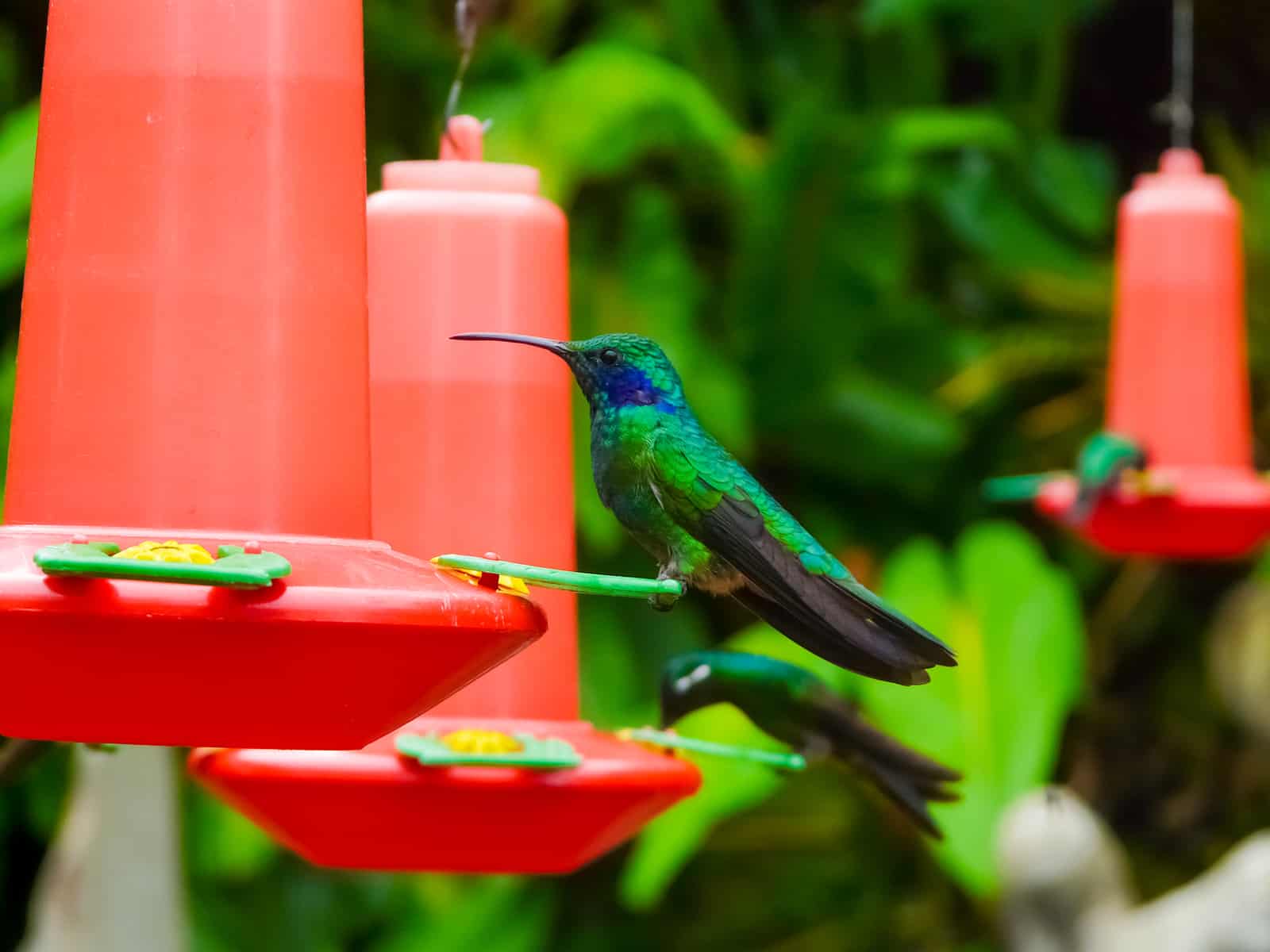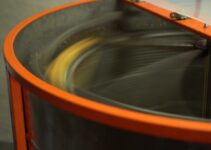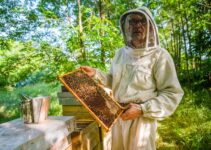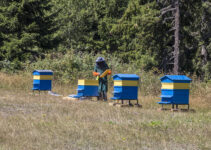Many people enjoy attracting birds to their gardens, including hummingbirds. Unfortunately, hummingbirds are not the only critters that are attracted to hummingbird feeders. How do you keep bees away from these feeders and encourage the hummingbirds only?
Keeping bees away from hummingbird feeders requires using feeders where the bees can’t reach the nectar, a feeder in a color that doesn’t attract bees, keeping the feeder clean, positioning the shade, and changing its position regularly. Reduce the nectar sweetness to lessen its appeal to bees.
Attracting hummingbirds to your garden is relatively easy if these birds are native to your area. The problem is hummingbird feeders don’t only attract these nectar-loving birds. Bees also enjoy the sweet nectar and will be attracted to the feeder as well. A few simple strategies will help keep bees away from your hummingbird feeder.
Keeping Bees Away From Hummingbird Feeders
The birds and the bees don’t always make a good combination, especially when the birds you want to attract to your garden are hummingbirds.
Hummingbirds are small birds, which means they are wary visitors and are easily outcompeted at the hummingbird feeder for the nectar you put out to attract them.
If your feeder is overcrowded and overwhelmed with bees, the hummingbirds may find it too much trouble to compete with this large number of bees and move on to find a food source with less competition.
Why Are Bees Attracted To Hummingbird Feeders?
Bees can’t resist a sugary treat, which makes them naturally attracted to the nectar in most hummingbird feeders.
Bees are particularly attracted to these bird feeders if there is not a lot of natural forage available for them in the area. This lack of resources could be due to the season or a general lack of nearby nectar-bearing flowers in the area.
The bees will expend less energy feeding from your conveniently located hummingbird feeder rather than traveling far afield to find natural resources.
Planting nectar-rich flowers in your garden is a method of attracting bees as well as hummingbirds to your garden. The bees generally prefer a natural nectar source over sugar water, so a nectar-rich garden will make them less interested in your hummingbird feeder.
There are some other effective strategies you can use to keep the bees at bay and give the hummingbirds exclusive use of the feeders.
1. Choose Your Hummingbird Feeder Style Carefully
Many hummingbird feeder styles are available, but some are designed better than others. The best method to keep bees away from your hummingbird feeder is to choose a feeder that does not give the bees access to the nectar.
The best hummingbird feeder is one that allows the hummingbirds access to the nectar via their long beaks and tongues but keeps the nectar out of reach for the bees.
Small holes in the feeders allow the hummingbirds to push their long beaks through the narrow opening, but the bees are not able to reach the nectar through the small hole.
This hummingbird feeder is one we can recommend with these features to keep the bees away.
2. Select A Hummingbird Feeder Color That Does Not Attract Bees
Bees are attracted to certain colors more than others. They have learned which colors can be associated with flowers that offer abundant nectar, and they will be drawn naturally to these colors.
Purple, blue, violet and yellow are the main colors that bees will home in on, while red is a color they usually ignore. Red is, therefore, the best color hummingbird feeder to choose to limit the bees’ attraction to the feeder.
3. Move The Hummingbird Feeder Regularly
Another strategy to keep bees and other insects away from your hummingbird feeder is to keep the insects guessing as to the location of the feeder.
Bees communicate with other bees in their colony and tell them where to find easily available abundant resources. Moving your hummingbird feeder around in your garden will confuse the communication between the bees, and they will look for the feeder in the old location.
As long as you move the feeder a good distance from the original location, you may be able to outwit the bees for a time until they locate the feeder from its scent.
This remedy is not a permanent solution since the bees will eventually figure out the new location, but combining this strategy with the other recommendations will help to keep the bees away.
4. Clean The Hummingbird Feeder Regularly
It is important to clean the hummingbird feeder daily, particularly if there are a lot of bees around your garden.
If you spill nectar around the feeder when refilling it, this spillage will attract bees, ants, and other critters you don’t want around it.
Hummingbirds are also sometimes messy feeders and can drop some nectar from their beaks on the outside of the feeder. This can also attract bees to the feeder, and they will drink the spilled nectar.
To keep the bees away, make sure to clean the feeder daily and wipe away any nectar on the outside of the feeder.
5. Hang The Hummingbird Feeder In The Shade
Most pollinator insects and other insects that feed on nectar in flowers prefer to feed in full sunlight. The sun’s bright light helps the insects to detect colors better, and the heat from the sun causes the fragrance from the flowers to be released in more abundance.
These characteristics make locating food and feeding in direct sunlight a common habit for these insects. Flowers in the shade often do not get the same attention as those in the direct sun.
You can take advantage of this characteristic of pollinator insects and position your hummingbird feeder in the shade.
This location will make the feeder harder to find for the bees and other insects that the sugar water may attract.
6. Use A Diversion Feeder To Attract Bees
If you want to feed the bees as well as attract hummingbirds to your garden, you can take the approach of having two feeders in your yard; one for the hummingbirds and one for the bees.
If you make your hummingbird feeder a type that the bees cannot access the nectar but locate a bee nectar feeder close by, the bees attracted to the hummingbird feeder can find a quick meal at the alternate bee feeder.
As long as the alternate feeder is suitable for bees, it will act as a diversion and attract the bees to the easily accessible nectar and steer them away from the hummingbird feeder.
7. Use A Different Sugar Ratio In Hummingbird Feeders
Bees are attracted to stronger sugar levels in nectar than hummingbirds. You can use the bees’ preference for sweeter nectar to your advantage.
Bees prefer a 1:1 sugar-to-water ratio in their sugar water, while hummingbirds are less fussy and will accept nectar with lower sugar content in the feeder.
Change up the sugar-to-water ratio in your hummingbird feeder until you find a recipe that keeps the birds coming back but leaves the bees disinterested.
I have found that there is a sweet spot of 1 part sugar to 5 parts water that seems to work, but you may need to play around with these ratios for the birds in your area.
Conclusion
The strategy way to keep bees away from your hummingbird feeder is to ensure that you use a feeder where the bees cannot reach the nectar. Keep the feeder clean to avoid attracting bees to the spills, and choose a feeder whose color won’t attract bees.
Providing an alternative food source for the bees is a good way to attract both bees and hummingbirds to your garden, each with its own accessible food source.
References
https://www.bobvila.com/articles/how-to-keep-bees-away-from-hummingbird-feeders/
https://www.thespruce.com/keeping-bees-away-from-hummingbird-feeders-386570
https://worldbirds.com/how-to-keep-bees-away-from-hummingbird-feeder/




